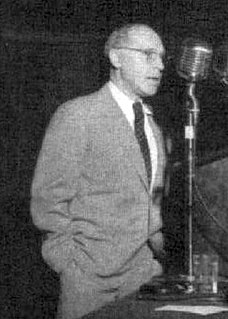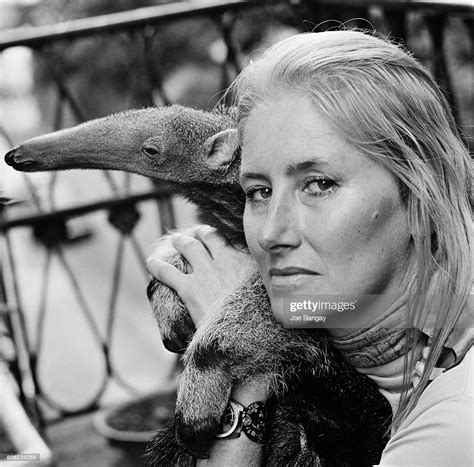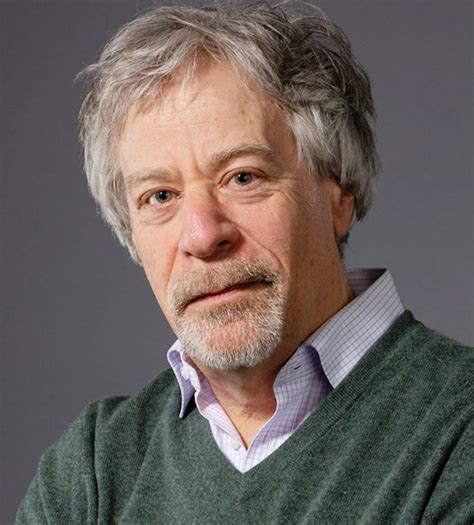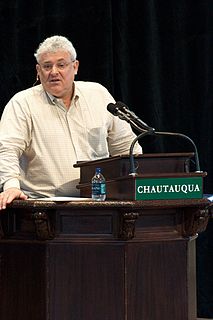Top 702 Genetic Quotes & Sayings - Page 12
Explore popular Genetic quotes.
Last updated on April 20, 2025.
The choices you make each day in your diet and lifestyle have a direct influence on how your genetic predisposition is expressed - for better and for worse. You're only as old as your genes, but how your genes are expressed may be modified by exercise, diet and lifestyle choices much more than had previously been believed - and more quickly.
Is he a dread genetic determinist, or a dread environmental determinist? He is neither, of course, for both these species of bogeyman are as mythical as werewolves. By increasing the information we have about the various causes of the constraints that limit our current opportunities, he has increased our powers to avoid what we want to avoid, prevent what we want to prevent. Knowledge of the roles of our genes, and the genes of the other species around us, is not the enemy of human freedom, but one of its best friends.
You can imagine a different world in which a number of species developed with different genetically determined linguistic systems. It hasn't happened in evolution. What has happened is that one species has developed, and the genetic structure of this species happens to involve a variety of intricate abstract principles of linguistic organization that, therefore, necessarily constrain every language, and, in fact, create the basis for learning language as a way of organizing experience rather than constituting something learned from experience.
A recent review of different agricultural options for the future was conducted by a panel of experts. The scientists posed the question: How are we going to feed the world when there are nine billion people on it, as there will be by 2050? And the answer they came up with was industrial agriculture won't work and genetic engineering won't work and the solution is going to be sustainable, and going to ecological kinds of farming that are based on local environmental conditions that work with local ecosystems available to develop a richer kind of farming technology.
There is no permanent status quo in nature; all is the process of adjustment and readjustment, or else eventual failure. But man is the first being yet evolved on earth which has the power to note this changefulness, and, if he will, to turn it to his own advantage, to work out genetic methods, eugenic ideas, yes, to invent new characteristics, organs, and biological systems that will work out to further the interests, the happiness, the glory of the God-like being whose meager foreshadowings we the present ailing creatures are.
Some innate capacity - some part of the human genetic endowment - enters into language acquisition. That much is uncontroversial among those who believe that humans are part of the natural world. If it were not true, would be a miracle that my granddaughter reflexively identified some elements of the blooming buzzing confusion as language-related and went on to acquire capacities of the kind that you and I are now exercising, while her pet kitten (chimp, songbird, bee...), presented with exactly the same data, could not take the first step, let alone the later ones.
Why run? I run because I am an animal. I run because it is part of my genetic wiring. I run because millions of years of evolution have left me programmed to run. And finally, I run because there’s no better way to see the sun rise and set... What the years have shown me is that running clarifies the thinking process as well as purifies the body. I think best - most broadly and most fully - when I am running.
The theory I'm putting forward here is that storytelling is a genetic characteristic in the sense that early human hunters who were able to organize events into stories were more successful than hunters who weren't—and this success translated directly into reproductive success. In other words, hunters who were storytellers tended to be better represented in the gene pool than hunters who weren't, which (incidentally) accounts for the fact that storytelling isn't just found here and there among human cultures, it's found universally.
It is our genetic nature as a species to believe as young children that our parents and elders are right. We watch them to see what's what. Later on we can judge for ourselves and rebel if need be, but when we're just months old, or a year or two, and a parent looks at us with impatience, or disgust, or disdain, or just leaves us there to cry and doesn't answer us even though we're longing to be embraced and nurtured, we assume that something must be wrong with us. Unfortunately, at that age it's impossible to think there might be something wrong with them.
We have opted for petty determinisms - childhood trauma, genetic inheritance, social conditioning, etc. - that have made us comparatively passive. We seem to prefer to find excuses - which are really nothing more than the embrace of determinism, a sort of Stockholm syndrome relative to whatever we can claim as limitation. I am fascinated by the more enabling self-understanding. It has helped me to find my way out of the cloying comforts that are offered by prevalent psychological models.
I do think it's interesting when people are born into families that at one point had huge amounts of money and that money has kind of vanished over the generations and they're sort of the last vestiges. You see that these people live really quite modestly and yet, somehow the way the clothes fit them, they still have some kind of strange genetic advantage over the rest of us. There's always these weird things in which you detect the legacy. There's a pair of cufflinks that you look at and go, "Oh, my God! These had to come from the Romanovs."
Religion shows a pattern of heredity which I think is similar to genetic heredity. ... There are hundreds of different religious sects, and every religious person is loyal to just one of these. ... The overwhelming majority just happen to choose the one their parents belonged to. Not the sect that has the best evidence in its favour, the best miracles, the best moral code, the best cathedral, the best stained-glass, the best music when it comes to choosing from the smorgasbord of available religions, their potential virtues seem to count for nothing compared to the matter of heredity.
Women speak an average 18,000 more words a day than men do. And there may be a genetic reason, it may be neurologically. Not that there's anything wrong with it. See, this is the thing. When you make the observation that women talk 18,000 more words a day than men, it's immediately taken as a criticism because it implies inequality. It implies that there's something wrong with women.
I have no ideals. I have no will that the world should be any better or worse or anything... Because I know that for every genius there exists a robbing murderer. There is nothing to do about that. The world is such that if you want to find the intensity within the genuine, you will at the same time find the criminals around the nearest corner. And if you eliminate that genetic quality in the human being, then everyone will become very inactive and very boring, but on the other hand we get rid of criminality.
Earlier this week ... scientists announced the completion of a task that once seemed unimaginable; and that is, the deciphering of the entire DNA sequence of the human genetic code. This amazing accomplishment is likely to affect the 21st century as profoundly as the invention of the computer or the splitting of the atom affected the 20th century. I believe that the 21st century will be the century of life sciences, and nothing makes that point more clearly than this momentous discovery. It will revolutionize medicine as we know it today.
War to me is very much like sex. You can develop a theory that says sex is primarily for the exchange of genetic material, or that it's a celebration of life, or you can make up 50,000 theories about why human beings have sex, all of which are in some sense true, all of which by themselves miss the point. Because the answer is extraordinarily complex. It may be for fun, it may be for reproduction, for financial reasons, any number of things.
Well, if there is a spectrum between ethnic and civic forms of nationalism, which is a rather schematic way of looking at it, all nationalism contains elements of both, but Scotland is very far on the civic end of the spectrum. That is partly because nobody has ever been stupid enough to say that Scotland is an ethnicity in a genetic sense. A kingdom of Scotland existed long before anybody talked of a Scottish people. So that is one thing we have been spared.
Besides justifying the transfer of wealth to kleptocrats, institutionalized religion brings two other important benefits to centralized societies. First, shared ideology or religion helps solve the problem of how unrelated individuals are to live together without killing each other—by providing them with a bond not based on kinship. Second, it gives people a motive, other than genetic self-interest, for sacrificing their lives on behalf of others.
An excess of development can undermine the most ephemeral but distinctive tool a writer possesses: authorial voice. A writer's voice is as individual and marked as a thumbprint, and is a playwright's truest imprimatur. It is as innate as breathing, and can be as unique as any genetic code. By its very singular nature, it is seldom born in the act of collaboration. True authorial voice always pre-dates the first rehearsal of a text. And it is - and will always be - an author's most distinguishing and valuable feature.
We have the same genetic code for all living creatures. We have a large number of genes that are manifestly the same, but with detail differences - they look like different drafts of the same book. In extreme cases, like a human and a beetroot, it's like the difference between Matthew and Luke's Gospel - clearly they tell the same story, but with different words. Whereas with a human and a chimp, it's like two different printings of Matthew, with a few typos in one.
Biology is a science of three dimensions. The first is the study of each species across all levels of biological organization, molecule to cell to organism to population to ecosystem. The second dimension is the diversity of all species in the biosphere. The third dimension is the history of each species in turn, comprising both its genetic evolution and the environmental change that drove the evolution. Biology, by growing in all three dimensions, is progressing toward unification and will continue to do so.
Darwinian evolution is slow and gradual, step by step. Such an evolution can explain micro-evolution but not macro-evolution. For example, how did the eye evolve? The idea behind Darwinism is that organisms adapt, and that nature selects only those genetic changes which are the mutations that serve a good purpose for adaptation. So taken this way, the eye cannot develop gradually because one-thousandth or one-millionth of an eye would be of no value for survival. So generally this question rules out Darwinism as an adequate theory for macro-evolution.
My feeling is that a human being or any complex organism has a system of cognitive structures that develop much in the way the physical organs of the body develop. That is, in their fundamental character they are innate; their basic form is determined by the genetic structure of the organism. Of course, they grow under particular environmental conditions, assuming a specific form that admits of some variation. Much of what is distinctive among human beings is a specific manner in which a variety of shared cognitive structures develop.
What politicians do not understand is that [Ian] Wilmut discovered not so much a technical trick as a new law of nature. We now know that an adult mammalian cell can fire up all the dormant genetic instructions that shut down as it divides and specializes and ages, and thus can become a source of new life. You can outlaw technique; you cannot repeal biology.
Writing after Wilmut's successful cloning of the sheep, Dolly, that research on the cloning of human beings cannot be suppressed.
Regardless of the extent to which the media promote "politically correct," but scientifically wrong, resolutions from professional societies such as the American Anthropological Association, facts remain facts and require appropriate scientific, not political or ideological, explanation. None of this should be construed as meaning that environmental factors play no part in individual and group differences. But with each passing year and each new study, the evidence for the genetic contribution to these differences becomes more firmly established than ever.
Everything that has ever lived, plant or animal, dates its beginning from the same primordial twitch. At some point in an unimaginably distant past, some little bag of chemicals fidgeted to life. It absorbed some nutrients, gently pulsed, had a brief existence. This much may have happened many times before. But this ancestral packet did something additional and extraordinary. It cleaved itself and produced an heir. A tiny bundle of genetic material passed from one living entity to another, and has never stopped moving since. It was the moment of creation for us all.
I didn't know what I wanted to Be...A sense that I had permanently botched things already, embarked on the trip without the map. and it scared me too, that I might end up as a mother of 3 working in a psychiatrist's office, or renting surfboards...I guess I saw their lives as failed somehow, absent of the Big Win...What is fate was an inherited trait? What if luck came through the genetic line, and the ability to "succeed" at your chosen "direction" was handed down, just like the family china? Maybe I was destined to be a weed too.
If, as the dowager had said, we are nothing but gene carriers, why do so many of us have to lead such strangely shaped lives? Wouldn't our genetic purpose-to transmit DNA-be served just as well if we lived simple lives, not bothering our heads with a lot of extraneous thoughts, devoted entirely to preserving life and procreating? Did it benefit the genes in any way for us to lead such intricately warped, even bizarre, lives?
Our population and our use of the finite resources of planet Earth are growing exponentially, along with our technical ability to change the environment for good or ill. But our genetic code still carries the selfish and aggressive instincts that were of survival advantage in the past. It will be difficult enough to avoid disaster in the next hundred years, let alone the next thousand or million. Our only chance of long term survival, is not to remain inward looking on planet Earth, but to spread out into space.
The social dynamics of human history, even more than that of biological evolution, illustrate the fundamental principle of ecological evolution - that everything depends on everything else. The nine elements that we have described in societal evolution of the three families of phenotypes - the phyla of things, organizations and people, the genetic bases in knowledge operating through energy and materials to produce phenotypes, and the three bonding relations of threat, integration and exchange - all interact on each other.
When we cracked the genetic DNA code, opened the big Pandora's box, and it really did become possible to produce chimeras, my ears shot up. Having been brought up among the biologists and having followed various debates about ways to improve the human template and other debates about the true nature of our nature, I began seriously to wonder: What if? We hold in our hands a tool that is more powerful - for good or ill - than any we have wielded before.
We don't control everything. There are genetic influences. There are environmental exposures we don't control. I cannot guarantee anyone I counsel that by following what I hope is the good advice I offer them, they will live long and prosper. That's what I'm hoping for but I can't guarantee that. What I can tell them is this: "Look, I can help you firmly grip the wheel, and you can steer the ship. You're never going to control the winds and you're never going to control the seas. But if you sail well you can get through just about anything."
Renegade scientists and totalitarian loonies are not the folks most likely to abuse genetic engineering. You and I are-not because we are bad but because we want to do good. In a world dominated by competition, parents understandably want to give their kids every advantage. ... The most likely way for eugenics to enter into our lives is through the front door as nervous parents ... will fall over one another to be first to give Junior a better set of genes.
In a movie, a book, or a play, a character doesn't live in a vacuum. She is subject to pressures from the world outside of her, just like we are in life. These pressures and circumstances shape character. Who your parents are determines your genetic make up: your skin color, your sex, your height, weight. Where you are raised does affect your worldview either positively or negatively, your accent. Your economic class affects where you go to school, what you eat, where you sleep.
Your medical documents will say Acquired Immune Deficiency Syndrome that is AIDS. What that means you have got this challenge of immune deficiency. Alright what causes immune deficiency? HIV. Alright. Is that all that causes immune deficiency? The medical textbooks will say there are other things that cause immune deficiency. There is also genetic immune deficiency that is a different phenomenon.
Number one, we have to talk about mental illnesses. Number two, you can actually address things from a purer and honest direct line to what's been going on in your life and how you've been feeling and why you think the way you think. I do think there is a genetic predisposition for mental illness, for depression, for suicide, but I also think that lifestyle can change things. If you're an addict, if you drink and you're putting a depressant into your body, it's going to cause serious problems.
Let's set the existence-of-God issue aside for a later volume, and just stipulate that in some way, self-replicating organisms came into existence on this planet and immediately began trying to get rid of each other, either by spamming their environments with rough copies of themselves, or by more direct means which hardly need to be belabored. Most of them failed, and their genetic legacy was erased from the universe forever, but a few found some way to survive and to propagate.
But ultimately I do not believe that she was only matter. The rest of her must be recycled, too. I believe now that we are greater than the sum of our parts. If you take Alaska's genetic code and you add her life experiences and the relationships she had with people, and then you take the size and shape of her body, you do not get her. There is something else entirely. There is a part of her greater than the sum of her knowable parts. And that part has to go somewhere, because it cannot be destroyed
It was these same families [Rothschild, Rockefeller, Harriman, Bush, etc] who funded the eugenics movement which is pledged to remove the lower genetic blood streams and leave only those of superior stock. Eugenics today often goes under the title of 'population control'. The best known of the population control organizations is Planned Parenthood which began life under another name at the London offices of the British Eugenics Society.
You would think, wouldn’t you, that if you were the child of a happy marriage, then you ought to have a better than average marriage yourself – either through some genetic inheritance or because you’d learnt from example? But it doesn’t seem to work like that. So perhaps you need the opposite example – to see mistakes in order not to make them yourself. Except this would mean that the best way for parents to ensure their children have happy marriages would be to have unhappy ones themselves. So what’s the answer?
Human physical structures and intellectual structures are generally studied in different ways. The assumption is that physical structures are genetically inherited and intellectual structures are learned. I think that this assumption is wrong. None of these structures is learned. They all grow; they grow in comparable ways; their ultimate forms are heavily dependent on genetic predispositions.
Evolutionary biologists often appeal to parsimony when they seek to explain why organisms "match" with respect to a given trait. For example, why do almost all the organisms that are alive today on our planet use the same genetic code? If they share a common ancestor, the code could have evolved just once and then been inherited from the most recent common ancestor that present organisms share. On the other hand, if organisms in different species share no common ancestors, the code must have evolved repeatedly.





































